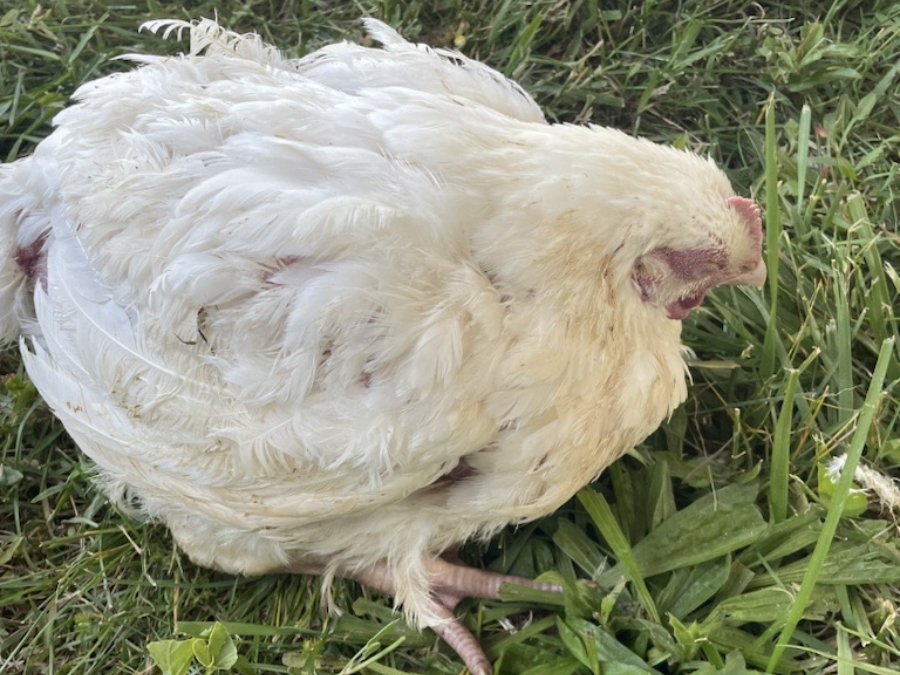Have you ever found a broiler dead on its back and wondered what happened? Well, chances are that chicken had a heart attack. This isn’t terribly uncommon if you’re raising Cornish Cross broilers on pasture. They are more prone to a disease called ascites (or water belly) which will often lead to heart attacks and the mortality of that bird.
What is ascites?
The scientific answer, its a disease caused by pulmonary hypertension resulting in the failure of one of the heart’s four chambers, specifically the right ventricle. Think right congestive heart failure. Ascites syndrome results from increased pressure in the pulmonary arteries when the heart tries to pump more blood through the lungs to meet the body’s oxygen requirement. The volume and pressure overload on the right ventricle leads to right heart failure, and ascites.
What causes ascites?
There are a few different causes of ascites, such as living in high elevations, poor air quality, or a cold, damp chill and even breed of bird. High elevation and poor air quality cause ascites in similar ways in that oxygen levels are limited. If the body’s oxygen requirement is not met, it leads to pressure of the right ventricular wall, resulting in a buildup of fluid in the body cavity. This causes heart attacks. We often see ascites in pastured based operations because broilers are exposed to the elements like a cold, damp chill. At some point while being on pasture, it rains, and if you’re raising birds in early spring or late fall, temperatures will decrease overnight. If you pair wet ground and wet chickens with cold weather, the result will be ascites. As pastured poultry producers, this is tough because birds are exposed to the elements. Chickens can get wet as long as they’re warm. But a cold, wet chicken will die later in life. Ascites doesn’t present itself overnight. It often takes a few weeks to fully show. You will see most deaths around 5 weeks and after. Breed is another factor to increased incidents of ascites. Cornish Cross are not a hearty breed, which is why they are more prone to this disease. In commercial houses, ascites is not as common due to improved genetics as well as temperature-controlled environments. Pastured raised birds do not experience such a controlled habitat. Cornish Cross chickens are simply not robust animals and because of this, management should be looked at accordingly. The biggest consideration is to give them a place to get out of the weather, and IDEALLY off the wet ground, if possible.
What are the signs of ascites?
Young broilers develop ascites syndrome, but mortality is the highest after 5 weeks. Some of the signs you’ll see are:
- Discoloration of the skin. This discoloration includes darkening of the skin and comb to a dark red/purple color, blue discoloration of the skin around the cone
- Ruffled feathers
- Difficulty breathing
- Lethargic
- Reduced growth rate
- Necropsy will show fluid around the heart, lung, and liver congestion
- Water belly (filled with fluid)
- What can you do to prevent ascites?
These are the top three management practices to prevent or reduce the incidence of ascites.
- Make certain that your brooder has proper ventilation to maximize oxygen and minimize ammonia and dust.
- If you live in high altitude areas (above 4,000 ft), feed a lower calorie diet.
- When there’s a significant amount of rain forecasted, make sure your chicken tractor has well constructed sides to prevent rain from entering. Also provide straw or shavings to place beneath your birds so they are not exposed to the wet ground.
Part of raising chickens on pasture is their experience of being in the natural habitat of the outdoors allowing them to forage on fresh grass and bugs. The downside of raising livestock on pasture is they are more exposed to the nature’s elements. Cornish Cross chickens are fast growing and efficient on feed, but they simply do not flourish in difficult environmental conditions. If Cornish Cross chickens are your choice of broilers, we need to look at management practices to best set them up for success since we are adapting them to an environment for which they were not bred.
Ascites Syndrome in Chickens. PoultryDVM. (n.d.). https://poultrydvm.com/condition/ascites-syndrome
Hargis, B. M. (2023, June). Ascites Syndrome in Poultry. Merck Manual. https://poultrydvm.com/condition/ascites-syndrome

